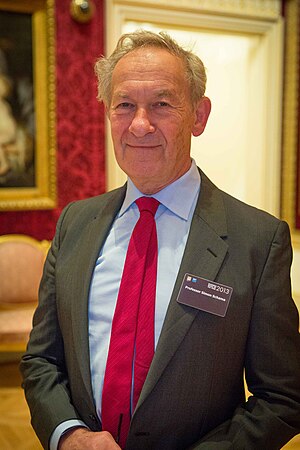
“My father read Dickens out loud. My mother would say Were going to the workhouse. This to me was real. I was headed for the gruel.”
Share this quote:
“He was a frustrated theatrical impresario, basically”
Share this quote:
“Walking on camera is damn hard. Its a Jewish problem. The rangy stride across the blasted moor is not really a Jewish thing.”
Share this quote:
“But it struck me that the extreme violence and cruelty of the English Civil War had gone understated.”
Share this quote:
“A terrible vanity, really, but as you get older...”
Share this quote:
“she writes family scenes better than anyone else I can think of.”
Share this quote:
“It was a conscious decision by (Sir Robert) Walpole and others to replace religion with making money. Elections replaced battles, and the fights were over party politics.”
Share this quote:
“We find a way (in each country) to contain our differences of opinion without annihilating one another.”
Share this quote:
“Historians are left forever chasing shadows, painfully aware of their inability ever to reconstruct a dead world in its completeness however thorough or revealing their documentation. We are doomed to be forever hailing someone who has just gone around the corner and out of earshot.”
Share this quote:
Historians are left forever chasing shadows, painfully aware of their inability ever to reconstruct a dead world in its completeness however thorough or revealing their documentation. We are doomed to be forever hailing someone who has just gone around the corner and out of earshot.
Share this quote:
I actually think that history has fed off the restlessness of cyber space, of kind of the frantic, segmented nature of the way we lead our lives. People want to be connected.
Share this quote:
The history of the Jews has been written overwhelmingly by scholars of texts - understandably given the formative nature of the Bible and the Talmud. Seeing Jewish history through artifacts, architecture and images is still a young but spectacularly flourishing discipline thats changing the whole story.
Share this quote:
In Mesopotamia or Egypt, for example, the monarch had a god-like religious status. But this is not the case in Judaism. So that notion that religion can go on, when all the markers of power and trappings of monarchy disappear, ultimately serves the endurance of Judaism very well.
Share this quote:
The challenge for a nonfiction writer is to achieve a poetic precision using the documents of truth but somehow to make people and places spring to life as if the reader was in their presence.
Share this quote:
Sculptures created from found materials like ice and thorns, driftwood, and even bleached kangaroo bones all presuppose that artistic design will yield to the cycles of time and climate, whether over an hour or a decade.
Share this quote:
History gives you insight of the same quality of truth as poetry or philosophy or a novel.
Share this quote:
Somehow, the words dont have any vitality, any life to them, unless I can feel it marking on a paper. Thats how I start. Once Im off, then I switch to the laptop. I think it would all just be prose if it started on a laptop - not that what I do is poetry.
Share this quote:
As a schoolboy, poetry seemed defined by preciousness. It was all very rarefied.
Share this quote:
The difficulty with poetry is that it doesnt have the life that Shakespeare or Jane Austen have beyond the page. You cant make a costume drama out of it. Theres no place for it to go except trapped inside its little book.
Share this quote:
The Elephantine papyri - written as some of the books of the Bible are being written - is true social and legal documentation, and to historians overwhelmingly powerful and moving, even when ostensibly about trivial things.
Share this quote: